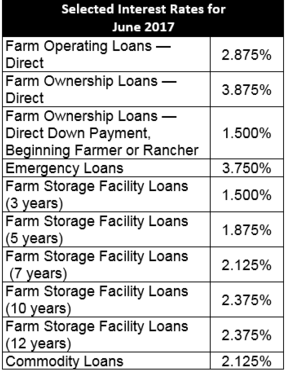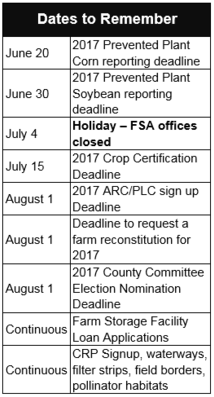|
 Under these designated farm loan programs, FSA can provide
financing to eligible applicants through either direct or
guaranteed loans. FSA defines a beginning farmer as a person
who: Under these designated farm loan programs, FSA can provide
financing to eligible applicants through either direct or
guaranteed loans. FSA defines a beginning farmer as a person
who:
Has operated a farm for not more than 10 years
-
Will materially and substantially
participate in the operation of the farm
-
Agrees to participate in a loan assessment,
borrower training and financial management program sponsored
by FSA
-
Does not own a farm in excess of 30 percent
of the county’s average size farm. Additional program
information, loan applications, and other materials are
available at your local USDA Service Center. You may also
visit www.fsa.usda.gov.
Change in Farming Operation
If you have bought or sold land, or if you have picked up or
dropped rented land from your operation, make sure you report
the changes to the office as soon as possible. You need to
provide a copy of your deed or recorded land contract for
purchased property.

Failure to maintain accurate records with FSA on all land you
have an interest in can lead to possible program ineligibility
and penalties. Making the record changes now will save you time
in the future. Update signature authorization when changes in
the operation occur. Producers are reminded to contact the
office if there is a change in operations on a farm so that
records can be kept current and accurate.
Loans for Targeted Underserved Producers
FSA has a number of loan programs available to assist applicants
to begin or continue in agriculture production. Loans are
available for operating type loans and/or to purchase or improve
farms or ranches.
While all qualified producers are eligible to apply for these
loan programs, FSA has provided priority funding for members of
targeted underserved applicants.
A targeted underserved applicant is one of a group whose members
have been subjected to racial, ethnic or gender prejudice
because of his or her identity as members of the group without
regard to his or her individual qualities.
For purposes of this program, targeted underserved groups are
women, African Americans, American Indians, Alaskan Natives,
Hispanics, Asian Americans and Pacific Islanders.
FSA loans are only available to applicants who meet all the
eligibility requirements and are unable to obtain the needed
credit elsewhere. You may also visit
www.fsa.usda.gov.
FSA County Committee Nomination Period is Now Open
The nomination period for all FSA county committees begins on
June 15, 2017. Nomination forms must be postmarked or received
in the County FSA Office by close of business on Aug. 1, 2017.

County Committees are unique to FSA and allow producers to have
a voice on federal farm program implementation at the local
level.
To be eligible to serve on the FSA county committee, a person
must participate or cooperate in an agency administered program,
be eligible to vote in a county committee election and reside in
the Local Administrative Area (LAA) where they are nominated.
All producers, including women, minority and beginning farmers
and ranchers are encouraged to participate in the nomination and
election process.
Producers may nominate themselves or others as candidates.
Organizations representing minority and women farmers and
ranchers may also nominate candidates. To become a nominee,
eligible individuals must sign form FSA-669A. The form and more
information about county committee elections is available online
at: www.fsa.usda.gov/elections.
Elected county committee members serve a three-year term and are
responsible for making decisions on FSA disaster, conservation,
commodity and price support programs, as well as other important
federal farm program issues. County committees consist of three
members.
FSA will mail election ballots to eligible voters beginning
November 6, 2017. Ballots are due back in the County Office by
mail or in person no later than December 4, 2017. All newly
elected county committee members and alternates will take office
January 1, 2018.

For more information about county committees, please contact
your local County FSA office or visit
www.fsa.usda.gov/elections.
Payment Limitation
Program payments are limited by direct attribution to
individuals or entities. A legal entity is defined as an entity
created under Federal or State law that owns land or an
agricultural commodity, product or livestock. Through direct
attribution, payment limitation is based on the total payments
received by the individual, both directly and indirectly.
Qualifying spouses are eligible to be considered separate
persons for payment limitation purposes, rather than being
automatically combined under one limitation.
Payments and benefits under certain FSA programs are subject to
some or all of the following:
-
payment limitation by direct attribution
-
payment limitation amounts for the applicable
programs
-
actively engaged in farming requirements
-
cash-rent tenant rule
-
foreign person rule
-
average AGI limitations
-
programs subject to AGI limitation
-
effective date of implementation of AGI
limitation
No program benefits subject to payment
eligibility and limitation will be provided until all required
forms for the specific situation are provided and necessary
payment eligibility and payment limitation determinations are
made. Payment eligibility and payment limitation determinations
may be initiated by the County Committee or requested by the
producer. There are statutory provisions that require entities,
earning program benefits that are subject to limitation, to
provide the names, addresses, and TINs of the entities’ members
to the County Committee. All applicable payment eligibility and
payment limitation forms submitted by producers are subject to
spot check through the end-of-year review process.
Producers selected for end-of-year review must provide the
County Committee with operating loan documents, income and
expense ledgers, canceled checks for all expenditures, lease and
purchase agreements, sales contracts, property tax statements,
equipment listings, lease agreements, purchase contracts,
documentation of who provided actual labor and management,
employee time sheets or books, crop sales documents, warehouse
ledgers, gin ledgers, corporate or entity papers, etc. A
determination of not actively engaged in farming results in the
producer being ineligible for any payment or benefit requiring a
determination of actively engaged in farming. Noncompliance with
AGI provisions, either by exceeding the applicable limitation or
failure to submit a certification and consent for disclosure
statement, will result in the determination of ineligibility for
all program benefits subject to AGI provisions.

Program benefits shall be reduced in an amount that is
commensurate with the direct and indirect interest held by an
ineligible person or legal entity in any legal entity, general
partnership, or joint operation that receives benefits subject
to the average AGI limitations. If any changes occur that could
affect an actively engaged in farming, cash-rent tenant, foreign
person, or average Adjusted Gross Income (AGI) determination,
producers must timely notify their County FSA Office by filing
revised farm operating plans and/or supporting documentation, as
applicable. Failure to timely notify the County FSA Office may
adversely affect payment eligibility.
The
USDA Farm Service Agency (FSA) recently made several policy
updates for acreage reporting for cover crops, revising intended
use, late-filed provisions, grazing allotments as well as
updated the definitions of “idle” and “fallow.”
Reporting Cover Crops:
FSA
made changes to the types of cover crops. Cover crop types can
be chosen from the following four categories:
-
Cereals and other grasses -
Any cover crop that is classified as a grass plant or cereal
grain, and would include, but not be limited to, the
following cover crops: cereal rye, wheat, barley, oats,
black oats, triticale, annual ryegrass, pearl millet,
foxtail millet (also called German, Italian or Hungarian
millet), sorghum sudan grass, sorghum and other millets and
grasses.
-
Legumes -
Any cover crop that is classified as a legume, including,
but not limited to, clovers, vetches, peas, sun hemp,
cowpeas, lentils and other legumes.

-
Brassicas and other broadleaves -
Any cover crop that is classified as a non-legume broadleaf,
including, but not limited to, Brassicas such as radishes,
turnips, canola, rapeseed, oilseed rape, and mustards, as
well as other broadleaf plants such as phacelia, flax,
sunflower, buckwheat, and safflower.
-
Mixtures -
Mixes of two or more cover crop species planted at the same
time, for example, oats and radishes. If the cover crop is
harvested for any use other than forage or grazing and is
not terminated according to policy guidelines, then that
crop will no longer be considered a cover crop and the
acreage report must be revised to reflect the actual crop.
Permitted Revision of Intended use After Acreage Reporting Date:
New
operators or owners who pick up a farm after the acreage
reporting deadline has passed and the crop has already been
reported on the farm, have 30 days to change the intended use.
Producer share interest changes alone will not allow for
revisions to intended use after the acreage reporting date. The
revision must be performed by either the acreage reporting date
or within 30 calendar days from the date when the new operator
or owner acquired the lease on land, control of the land or
ownership and new producer crop share interest in the previously
reported crop acreage. Under this policy, appropriate
documentation must be provided to the County Committee’s
satisfaction to determine that a legitimate operator or
ownership and producer crop share interest change occurred to
permit the revision.
Acreage Reports:
In
order to maintain program eligibility and benefits, producers
must timely file acreage reports. Failure to file an acreage
report by the crop acreage reporting deadline may result in
ineligibility for future program benefits. FSA will not accept
acreage reports provided more than a year after the acreage
reporting deadline.
Definitions of Terms
FSA
defines “idle” as cropland or a balance of cropland within a
Common Land Unit (CLU) (field/subfield) which is not planted or
considered not planted and does not meet the definition of
fallow or skip row. For example, a turn area that is not
planted would be reported as idle.
[to top of second column] |

Fallow is
considered unplanted cropland acres which are part of a crop/fallow
rotation where cultivated land that is normally planted is purposely
kept out of production during a regular growing season. Resting the
ground in this manner allows it to recover its fertility and
conserve moisture for crop production in the next growing season.
In order
to comply with FSA program eligibility requirements, all producers
are encouraged to visit their local FSA office to file an accurate
crop certification report by the applicable deadline.
Acreage
reporting dates vary by crop and by county so please contact your
local FSA office for a list of county-specific deadlines.
The
following exceptions apply to acreage reporting dates:
-
If the
crop has not been planted by the applicable acreage reporting
date, then the acreage must be reported no later than 15
calendar days after planting is completed.
-
If a
producer acquires additional acreage after the applicable
acreage reporting date, then the acreage must be reported no
later than 30 calendars days after purchase or acquiring the
lease. Appropriate documentation must be provided to the county
office.
-
If a
perennial forage crop is reported with the intended use of “left
standing,” or “seed,” then the acreage must be reported by July
15th. Noninsured Crop Disaster Assistance Program
(NAP) policy holders should note that the acreage reporting date
for NAP covered crops is the earlier of the applicable dates or
15 calendar days before grazing or harvesting of the crop
begins.

2017 Acreage Reporting Dates in Illinois are:
June 15, 2017
cucumbers (planted 5/1 – 5/31)
July 15, 2017
All other spring and summer planted crops (corn, soybeans,
pumpkins, sweet corn etc.)
August 15, 2017
cabbage (planted 6/1 – 7/20)
September 15, 2017
cucumbers (planted 6/1 – 8/15)
For questions regarding crop certification and crop loss reports,
please contact your local FSA office.
FSA’s Farm
Storage Facility Loan (FSFL) program provides low-interest financing
to producers to build or upgrade storage facilities and to purchase
portable (new or used) structures, equipment and storage and
handling trucks.
The
low-interest funds can be used to build or upgrade permanent
facilities to store commodities. Eligible commodities include corn,
grain sorghum, rice, soybeans, oats, peanuts, wheat, barley, minor
oilseeds harvested as whole grain, pulse crops (lentils, chickpeas
and dry peas), hay, honey, renewable biomass, fruits, nuts and
vegetables for cold storage facilities, floriculture, hops, maple
sap, rye, milk, cheese, butter, yogurt, meat and poultry
(unprocessed), eggs, and aquaculture (excluding systems that
maintain live animals through uptake and discharge of water).
Qualified facilities include grain bins, hay barns and cold storage
facilities for eligible commodities.
Loans up
to $50,000 can be secured by a promissory note/security agreement
and loans between $50,000 and $100,000 may require additional
security. Loans exceeding $100,000 require additional security.

Producers
do not need to demonstrate the lack of commercial credit
availability to apply. The loans are designed to assist a diverse
range of farming operations, including small and mid-sized
businesses, new farmers, operations supplying local food and farmers
markets, non-traditional farm products, and underserved producers.
To learn
more about the FSA Farm Storage Facility Loan, visit www.fsa.usda.gov/pricesupport or
contact your local FSA county office. To find your local FSA
county office, visithttp://offices.usda.gov.
Producers
who want to use the Noninsured Crop Disaster Assistance Program
(NAP) organic price and selected the "organic" option on their NAP
application must report their crops as organic.
When
certifying organic acres, the buffer zone acreage must be included
in the organic acreage.
Producers
must also provide a current organic plan, organic certificate or
documentation from a certifying agent indicating an organic plan is
in effect. Documentation must include:
-
name
of certified individuals
-
address
-
telephone number
-
effective date of certification
-
certificate number
-
list
of commodities certified
-
name
and address of certifying agent
-
a map
showing the specific location of each field of certified
organic, including the buffer zone acreage
Certification exemptions are available for producers whose annual
gross agricultural income from organic sales totals $5,000 or less.
Although exempt growers are not required to provide a written
certificate, they are still required to provide a map showing the
specific location of each field of certified organic, transitional
and buffer zone acreage.

For
questions about reporting organic crops, contact your local FSA
office. To find your local office, visit http://offices.usda.gov.
The
Agricultural Foreign Investment Disclosure Act (AFIDA) requires all
foreign owners of U.S. agricultural land to report their holdings to
the Secretary of Agriculture. Foreign persons who have purchased or
sold agricultural land in the county are required to report the
transaction to FSA within
90 days of
the closing. Failure to submit the AFIDA form could result in civil
penalties of up to 25 percent of the fair market value of the
property. County government offices, realtors, attorneys and others
involved in real estate transactions are reminded to notify foreign
investors of these reporting requirements.
Bins are
ideally designed to hold a level volume of grain. When bins are
overfilled and grain is heaped up, airflow is hindered and the
chance of spoilage increases.
Producers
who take out marketing assistance loans and use the farm-stored
grain as collateral should remember that they are responsible for
maintaining the quality of the grain through the term of the loan.
Program
participants convicted under federal or state law of any planting,
cultivating, growing, producing, harvesting or storing a controlled
substance are ineligible for program payments and benefits. If
convicted of one of these offensives, the program participant shall
be ineligible during that crop year and the four succeeding crop
years for price support loans, loan deficiency payments, market loan
gains, storage payments, farm facility loans, Non-insured Crop
Disaster Assistance Program payments or disaster payments.
Program
participants convicted of any federal or state offense consisting of
the distribution (trafficking) of a controlled substance, at the
discretion of the court, may be determined ineligible for any or all
program payments and benefits:
-
for up
to 5 years after the first conviction
-
for up
to 10 years after the second conviction
-
permanently for a third or subsequent conviction

Program
participants convicted of federal or state offense for the
possession of a controlled substance shall be ineligible, at the
discretion of the court, for any or all program benefits, as
follows:
-
up to
1 year upon the first conviction
-
up to
5 years after a second or subsequent conviction
If loan
grain has been disposed of through feeding, selling or any other
form of disposal without prior written authorization from the county
office staff, it is considered unauthorized disposition. The
financial penalties for unauthorized dispositions are severe and a
producer’s name will be placed on a loan violation list for a
two-year period. Always call before you haul any grain under loan.
June Interest Rates and
Important Dates to Remember


Illinois Farm Service Agency
3500 Wabash Ave.
Springfield, IL 62711
Phone:217-241-6600 ext. 2
Fax: 855-800-1760
www.fsa.usda.gov/il

Acting State Executive Director: Richard L. Graden
Acting State Committee:
Jill Appell-Chairperson
Brenda Hill-Member
Jerry Jimenez-Member
Joyce Matthews-Member
Gordon Stine-Member
Division Chiefs:
Doug Bailey
Jeff Koch
Randy Tillman
To find contact information for your local office go to
www.fsa.usda.gov/il
USDA is an equal opportunity
provider, employer and lender. To file a complaint of
discrimination, write: USDA, Office of the Assistant Secretary for
Civil Rights, Office of Adjudication, 1400 Independence Ave., SW,
Washington, DC 20250-9410 or call (866) 632-9992 (Toll-free Customer
Service), (800) 877-8339 (Local or Federal relay), (866) 377-8642
(Relay voice users). |